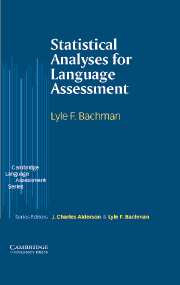Series Editor's Preface
Published online by Cambridge University Press: 05 May 2010
Summary
Language testing is frequently associated with statistics in the mind of language educators. Often for that very reason, language teachers feel that language testing is a somewhat alien discipline. Language teachers have indeed often chosen their career in reaction against the scientific disciplines they experienced in their school years, feeling that the Arts and Humanities are more in tune with their own interests, inclinations and competences.
The Cambridge Language Assessment Series (CLAS) does not share that view of language testing, as all the volumes published in the series to date attest. The CLAS view of language testing is that what is central to the discipline is language: the constructs that the tests and assessment procedures are seeking to evaluate. A solid background in applied linguistics or a related discipline is in our view crucial for the development of appropriate measures. However, the reader should note the use of the word ‘measure’. Language tests are intended to measure, and without quantification they cannot measure. Quantification implies numbers and numbers imply statistics. And so, although a firm understanding of the nature of language is essential for the trained language tester, so too is at least a basic familiarity with statistics, that is, those statistics that are commonly used in analysis and investigation of and with language tests.
This volume thus aims to complement the other volumes in CLAS by providing a firm grounding in such statistical procedures as are needed for language test analysis. There are, of course, many introductory textbooks to statistics, but there are very few that are specifically focussed on the needs of language testers.
- Type
- Chapter
- Information
- Statistical Analyses for Language Assessment Book , pp. ix - xiiPublisher: Cambridge University PressPrint publication year: 2004



